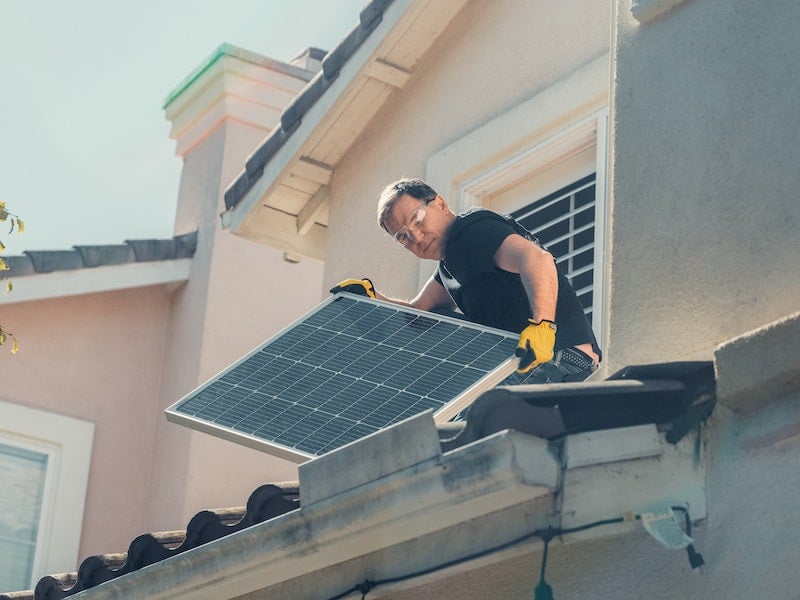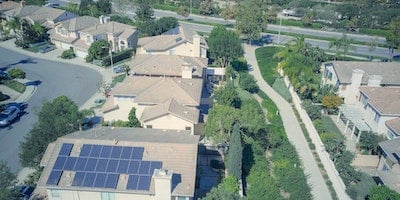
What are SRECs? Everything You Need to Know about Solar Energy Credits
Learn how Solar Energy Credits or SRECs work for your solar system.
Is solar right for you?
Find out in less than a minute.
Takeaways
-
SRECs can be a great addition to make your renewable energy system more profitable
-
SRECs are separate from net metering. This means if you are able to sell SRECs and also live in a state with net metering you are getting paid in two ways for your solar generation!
-
Not all states have an SREC market.
-
Market volatility, supply, administration complexity, and policy changes do pose challenges to getting involved
What are Solar Energy Credits (SRECs)?

Solar Renewable Energy Credits (SREC) are a performance-based incentive that allows you to earn credits for every megawatt-hour (MWh) of electricity your solar power system generates.
[INSERT CALLOUT] SRECs should not be confused with the federal solar tax credit that gives a one-time tax credit on new solar panel systems.
SRECs help utilities meet state regulations that require a certain percentage of electricity produced from renewable sources. These regulations are called Renewable Portfolio Standards (RPS). To meet the requirements of these standards utilities must purchase renewable energy certificates/creds (RECs) to serve as proof that they generated the electricity from renewable systems or paid someone who did.
Renewable Portfolio Standards (RPS)
Renewable Portfolio Standards (RPS) are regulations that require utilities to generate a certain percentage of power from renewable sources. In some states, this is called Clean Energy Standard or CES. The difference between CET and RPS is that “clean” generally refers to energy sources that have zero carbon emissions. For example, nuclear energy is usually considered a clean energy source because it is carbon-free, but it is not widely considered “renewable”.

There are 38 states that have RPS in place. Some RPS states have a solar carve-out that requires them to generate a certain percentage of renewable energy from solar. Solar carve-outs incentive SREC markets.
SREC vs REC
SREC is simply just a more specific form of REC. Renewable Energy Credit can refer to any type of renewable energy system: Wind, Hydro, or Geothermal to name a few. SREC or Solar Renewable Energy Credit is specific for solar systems.
Why SRECs are Important for Your Home Solar System?
SRECs create an additional financial incentive for your solar panels. Each SREC you are able to sell means more money in your pocket and increases the financial benefits of going solar. The value of SRECs varies depending on your state but they can be worth several thousand dollars each year or less than a few hundred dollars.
SRECs vs Net Metering
SRECs are separate from net metering. This means if you are able to sell SRECs and also live in a state with net metering you are getting paid in two ways for your solar generation!
Which states have SRECs?
Not all states have an SREC market. Additionally, some states are eligible to sell their system's SRECs to other states. For example, solar generators in West Virginia are able to sell SRECs in Ohio.
SREC Prices by State
State SREC price
- New Jersey* $223
- Massachusetts* $280
- Maryland $57.50
- Ohio $5.25
- Pennsylvania $46
- Washington DC $420
- *No longer accepting new applications to its SREC program.
SREC prices updated June 2023
How do you sell SRECs?

There are a few steps you must take before you can sell SRECs. In most cases, your solar panel installer will help you get started but, these are the steps to selling SRECs.
-
Register your solar panels with the SREC program
-
Your solar energy generation is monitored in the SREC system
-
Aggregators purchase SRECs
-
Aggregators sell them to utility companies
-
You get paid
In rare cases, your solar installer may offer to purchase the SRECs for your system in advance. This means more money upfront and can drastically reduce the upfront cost of your system. The downside is that since you are selling your SRECs upfront you won’t be able to cash in on any price increases in the future.
Selling SRECs can be complicated so we recommend using an aggregator like SRECTrade.com to navigate the SREC market.
What are the Risks and Downsides of SRECs?
Market Volatility
SREC Market volatility can make the prices of SRECs fluctuate significantly which instills uncertainty and risk for solar owners. It is similar to the stock market. Price is dependent on supply and demand, but also changes in renewable energy policy, and market conditions. The volatility makes it more challenging to predict SREC revenue and budgeting.
Limited Availability
Unfortunately, not every state has an SREC market. This creates further access limitations for homeowners.
Administrative Complexities
Administrative processes can be a pain. Registration and working with aggregators or brokers are time-consuming. More often than not, this requires ongoing monitoring and reporting of how much energy production your solar panel system generates. People have complained about the burdensome or difficult administrative tasks are to manage.
Oversupply and Decreasing Prices
With any investment, it's important to understand your market. With the rapid increase in solar projects, this causes an oversupply of SRECs and a decrease in pricing.
Policy Changes
Policies are always changing and it's difficult to keep up, even for people in the industry. All of these government policy and regulation changes causes SREC programs to change. All of which makes it difficult to predict SREC value and availability. In the past, the market has seen reductions in state-level solar carve-outs or the expiration of SREC programs. All of which potentially reduce financial benefits for solar system owners.
Written by Hannah Bastawrose (Seeger)
Hannah graduated from Penn State with a Bachelors Degree in Mechanical Engineering and a Minor in Meteorology.
Connect
Recent Posts
Compare Texas Solar Buyback Plans
Discover the best Texas solar energy buy back programs for 2025! Compare rates, terms, and providers to maximize savings and make the most of your solar investment.
September 2025

7 minutes

How Efficient Are Solar Panels
How efficient are solar panels compared to other types of energy generation?
March 2023

4 minutes

What You Need To Know About The California Solar Mandate
Learn how the California Solar Mandate changes how new homes are built.
July 2023

4 minutes



